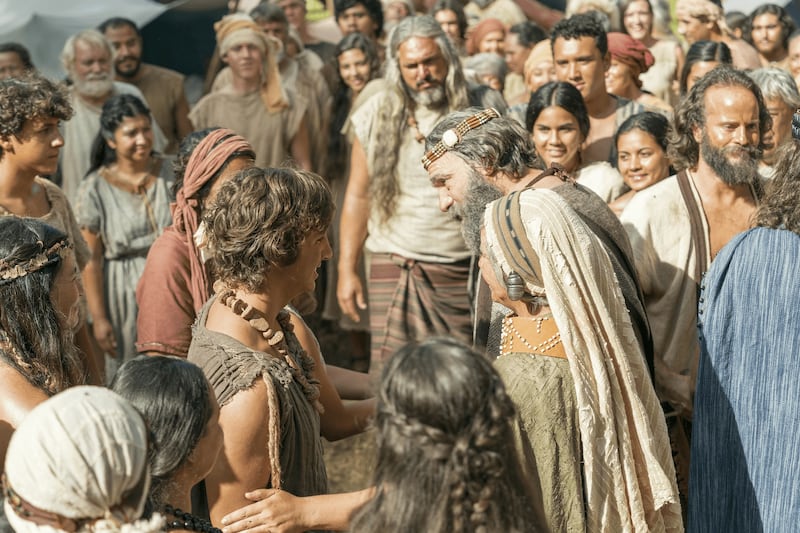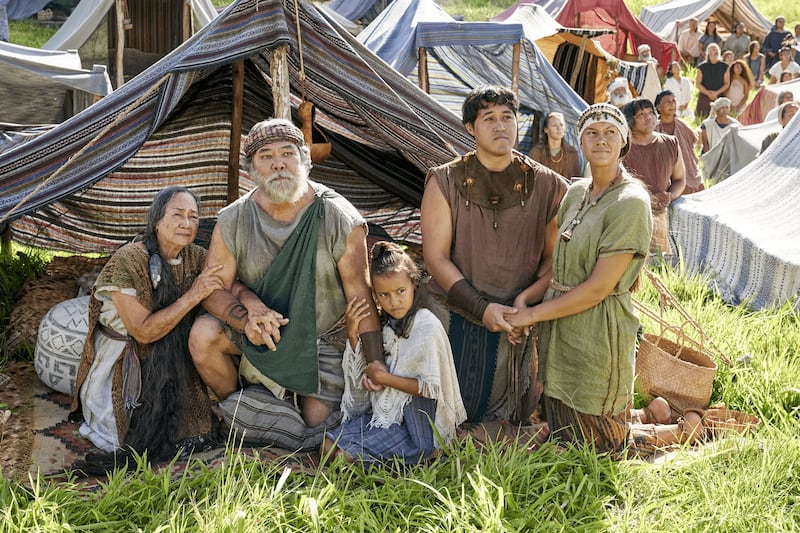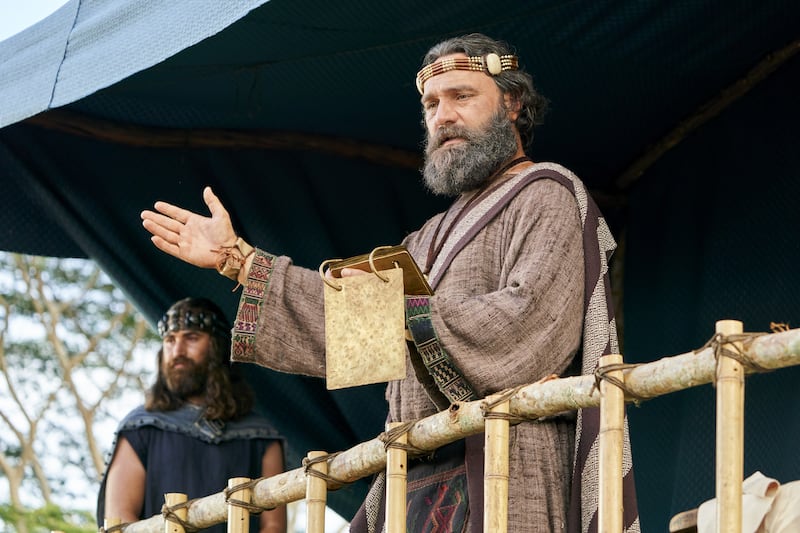This week’s “Come, Follow Me” study guide covers Mosiah 1-3, which includes the start of King Benjamin’s address to his people.
Following are a few quotes from past and present Church leaders and scholars about these chapters.
Mosiah 1
“In the Old Testament, the spiritual leaders were prophets. They are described in three different roles. Some were holy men performing a prophetic function for their posterity, like Abraham. Some were leaders exercising political as well as priestly power, like Moses and Joshua. Most were performing their prophetic role independent of patriarchal or political position, like Samuel and Isaiah. The Book of Mormon reports the same three positions of prophets, such as Lehi (patriarch), King Benjamin (political leader) and Alma the Younger (after he relinquished his position as the chief judge) (see 1 Nephi 1–2; Mosiah 1–6; Alma 4–5). However, it is clear that all the prophets who preceded Jesus Christ called the people to repentance, and, most of all, they prophesied of the coming Messiah.”
— President Dallin H. Oaks in the March 2020 Liahona article, “The Lord Leads His Church through Prophets and Apostles”
“Each of us has traditions in our families. Some of them are material. Some of them have deep meaning. The most important traditions are connected with the way we live our lives and will last beyond us as our children’s lives are influenced and shaped. In the Book of Mormon, we read of the Lamanites who were deeply affected by the traditions of their fathers. King Benjamin said they were a people who knew nothing about the principles of the gospel ‘or even do not believe them when they are taught them, because of the traditions of their fathers, which are not correct’ (Mosiah 1:5).
“What kinds of traditions do we have? Some of them may have come from our fathers, and now we are passing them along to our own children. Are they what we want them to be? Are they based on actions of righteousness and faith? Are they mostly material in nature, or are they eternal? Are we consciously creating righteous traditions, or is life just happening to us? Are our traditions being created in response to the loud voices of the world, or are they influenced by the still, small voice of the Spirit? Are the traditions that we are creating in our families going to make it easier for our children to follow the living prophets, or will they make it difficult for them?”
— Sister Cheryl C. Lant, then the Primary general president, April 2008 general conference, “Righteous Traditions”
“King Benjamin in the Book of Mormon set a wonderful example of how parents should teach their children from the scriptures, as found in Mosiah 1, beginning with verse 3. Note how many times he uses the word ‘remember.’
“’My sons, I would that ye should remember that were it not for these plates [meaning the scriptures], which contain these records and these commandments, we must have suffered in ignorance, even at this present time, not knowing the mysteries of God.
“For it were not possible that our father, Lehi, could have remembered all these things, to have taught them to his children… that thereby they could teach them to their children, and so fulfilling the commandments of God, even down to this present time.
“’I say unto you, my sons, were it not for these things, which have been kept and preserved by the hand of God, that we might read and understand of his mysteries, and have his commandments always before our eyes… even our fathers would have dwindled in unbelief. …
“’O my sons, I would that ye should remember that these sayings are true, and also these records are true. …
“’And now, my sons, I would that ye should remember to search them diligently, that ye may profit thereby; and I would that ye should keep the commandments of God’ (Mosiah 1:3–7).
“I bear testimony that keeping the scriptures ‘always before our eyes’ works! We have found the sweet influence of the Spirit in our home as we have learned from the scriptures daily with our children — beginning while the children were very young. Some mornings it meant putting ‘mind over mattress’ as we got out of bed early to gather as a family for scripture study, but ‘sacrifice brings forth the blessings of heaven’ (‘Praise to the Man,’ Hymns, 1985, no. 27).”
— Sister Joanne B. Doxey, then the second counselor in the Relief Society general presidency, October 1989 general conference, “’Remember Him’”

Mosiah 2
“We realized that we were sincerely striving to serve this family and to serve our bishop, but we had to ask ourselves if we were really serving out of love for the Lord. King Benjamin made clear this distinction when he stated, ‘Behold, I say unto you that because I said unto you that I had spent my days in your service, I do not desire to boast, for I have only been in the service of God’ (Mosiah 2:16).
“So whom was King Benjamin really serving? Heavenly Father and the Savior. Knowing the who and the why in serving others helps us understand that the highest manifestation of love is devotion to God.”
— Sister Joy D. Jones, then the Primary general president, October 2018 general conference, “For Him”
“With divine inspiration, King Benjamin declared, ‘When ye are in the service of your fellow beings ye are only in the service of your God’ (Mosiah 2:17). Those who serve will have greater understanding of the personality and attributes of God.
“Those who serve with devotion, even when things don’t turn out the way they would like, are not easily discouraged, fatigued, or frustrated because the promise of peace of mind and the companionship of the Holy Spirit will never abandon them.”
— Elder Carlos H. Amado, April 2008 general conference, “Service, a Divine Quality”
“We have so much for which to give thanks. First and foremost, we are thankful for our Savior Jesus Christ. Under the plan of the Father, He created the world. Through His prophets, He revealed the plan of salvation with its accompanying commandments and ordinances. He came into mortality to teach and show us the way. He suffered and paid the price for our sins if we would repent. He gave up His life, and He conquered death and rose from the grave that we all will live again. He is the Light and Life of the World. As King Benjamin taught, if we ‘should render all the thanks and praise which [our] whole soul has power to possess, to that God who has created [us], and has kept and preserved [us], and … should serve him with all [our] whole souls yet [we] would be unprofitable servants’(Mosiah 2:20–21).”
— Then-Elder Dallin H. Oaks, April 2003 general conference, “Give Thanks in All Things”
“Repentance includes recognizing that we have done wrong and need to repent, confessing our sins to the proper priesthood authority, restoring whatever can be restored and resolving to obey the Lord. Repentance brings about spiritual healing of the soul. In an address to his people, King Benjamin said, ‘Therefore if that man repenteth not, and remaineth and dieth an enemy to God, the demands of divine justice do awaken his immortal soul to a lively sense of his own guilt, which doth cause him to shrink from the presence of the Lord, and doth fill his breast with guilt, and pain, and anguish, which is like an unquenchable fire, whose flame ascendeth up forever and ever’ (Mosiah 2:38).”
— Elder Robert D. Hales, October 1998 general conference, “Healing Soul and Body”

“King Benjamin began his powerful sermon with these words: ‘You that can hear my words which I shall speak unto you this day; for I have not commanded you to come up hither to trifle with the words which I shall speak, but that you should hearken unto me, and open your ears that ye may hear, and your hearts that ye may understand, and your minds that the mysteries of God may be unfolded to your view’ (Mosiah 2:9).
“This admonition to open our ears to listen does not always receive the same response. While some people indicate a willingness to listen attentively and to be obedient to the words of the Lord, others seem to close their ears, not wanting to hear nor to obey. There are others who are slow to hear but who eventually do listen and become obedient. For all of these people, the result of their attitudes concerning the voice of the Lord will bring into their lives consequences which, in many instances, may be of an eternal nature.”
— Elder Francisco J. Viñas, October 1996 general conference, “Listening to the Voice of the Lord”
“I love to look at the picture of King Benjamin standing on the mighty tower with his loving arms outstretched to all his people. This beloved king, who spent his life in service to others, showed great humility when he willingly admitted his weaknesses and shortcomings and yet stated with conviction that he recognized his calling was from God.
“’I have not commanded you to come… that ye should fear me, or that ye should think that I of myself am more than a mortal man.
“’But I am like as yourselves, subject to all manner of infirmities in body and mind… and was suffered by the hand of the Lord that I should be a ruler and a king over this people… to serve you with all the might, mind and strength which the Lord hath granted unto me’ (Mosiah 2:10–11).
“When I feel inadequate and overwhelmed with my own weaknesses, I think of King Benjamin and try again.”
— Sister Ruth B. Wright, then the second counselor in the Primary general presidency, October 1990 general conference, “Draw Strength from the Book of Mormon”

Mosiah 3
“Mortality is an essential gift in our journey to become like our Heavenly Father. Of necessity, it includes trials and challenges that provide opportunities for us to change and grow. King Benjamin taught that ‘the natural man is an enemy to God… and will be, forever and ever, unless he yields to the enticings of the Holy Spirit, and putteth off the natural man and becometh a saint through the atonement of Christ the Lord’ (Mosiah 3:19). Participation in the sacrament ordinance provides an opportunity to more fully yield our hearts and souls to God.
“In our preparation, our hearts become broken as we express gratitude for Christ’s Atonement, repent of our mistakes and shortcomings, and ask for the Father’s help in our continuing journey to become more like Him. We can then look forward to the opportunity the sacrament provides to remember His sacrifice and renew our commitments to all the covenants we have made.”
— Elder Peter F. Meurs, October 2016 general conference, “The Sacrament Can Help Us Become Holy”
“The Lord through His servants calls us to serve in various callings, which we accept with total commitment. When a release has been extended and a call in a different assignment has been issued, we joyfully accept it, knowing, as our forebearers knew, that ‘in the service of the Lord, it is not where you serve but how’ (J. Reuben Clark Jr., in Conference Report, April 1951, 154).
“Thus when a stake president or a bishop is released, he joyfully accepts his release, and when a calling is extended to serve in any way which the Lord, through His servants, ‘seeth fit’ (Mosiah 3:19), he is not overshadowed by his previous experience, nor does he look back and think that he has served enough.”
— Elder Edward Dube, October 2013 general conference, “Look Ahead and Believe”
“Ancient prophets foresaw a day ‘when the knowledge of a Savior [would] spread throughout every nation, kindred, tongue and people’ (Mosiah 3:20). That day has come. And it is our turn to thrust in our sickles and help with the harvest. That we are here now is no accident. For aeons of time our Father watched us and knew He could trust us when so much would be at stake. We have been held in reserve for this very hour. We need to understand not just who we are but who we have always been. For we are women of God, and the work of women of God has always been to help build the kingdom of God.”
— Sister Sheri L. Dew, then the second counselor in the Relief Society general presidency, October 2000 general conference, “Stand Tall and Stand Together”
‘To achieve eternal goals, we must reconcile our earthly culture with the doctrine of the everlasting gospel. This process involves embracing all that is spiritually elevating in our family and societal traditions and discarding that which is a barrier to our eternal view and achievement. We must transform ourselves from being ‘natural’ men and women as defined by King Benjamin, and ‘becometh a saint’ by yielding ‘to the enticings of the Holy Spirit’ (see Mosiah 3:19).”
— Elder Donald L. Hallstrom, October 2000 general conference, “Cultivate Righteous Traditions”




